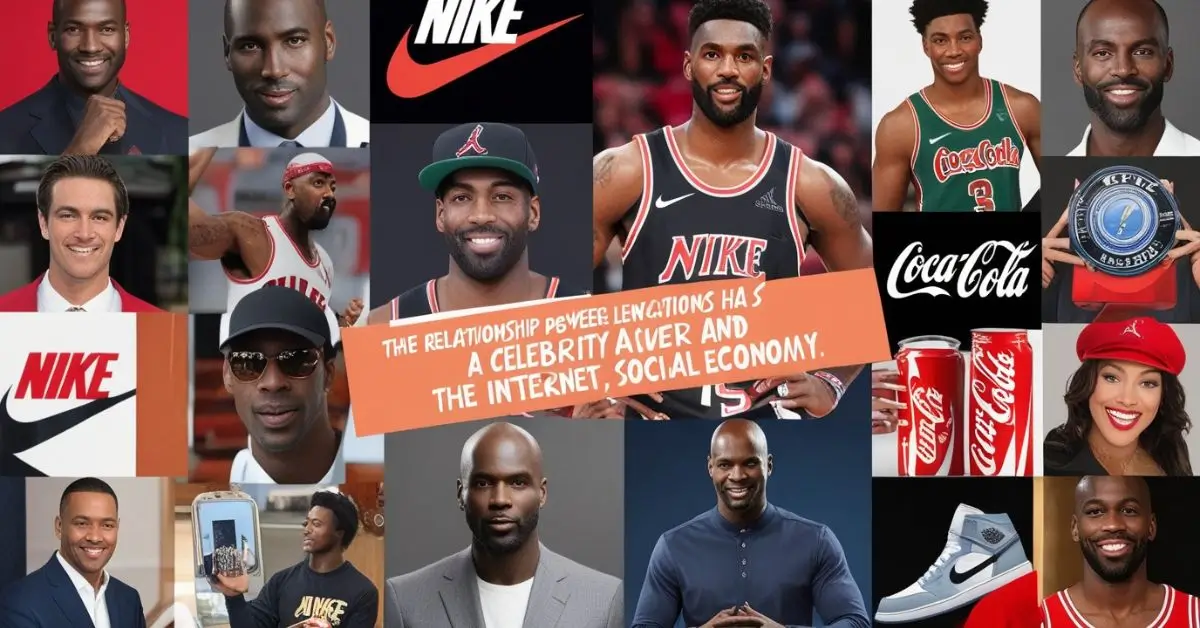In today’s digital world, the influence of celebrities has transcended the traditional boundaries of entertainment, sports, and fashion, permeating into broader aspects of the economy. This phenomenon, often referred to as the “celebeconomy,” is characterized by the powerful role celebrities play in shaping consumer behavior, marketing strategies, and even entire business sectors. The celebeconomy is more than just a trend; it is a fundamental shift in how businesses operate, driven by the digital age, social media platforms, and the convergence of entertainment with commerce.
This article explores the various facets of the celebeconomy, including its origins, mechanisms, and impact on different industries. From celebrity endorsements and collaborations to the rise of social media influencers, the celebeconomy is redefining how products and services are marketed, sold, and consumed.
Origins of the Celebeconomy: Celebrity Endorsements and Beyond
The relationship between celebrities and the economy is not a new phenomenon. For decades, companies have leveraged the star power of famous individuals to promote products. However, the scope of celebrity influence has expanded dramatically with the advent of the internet and social media. Traditionally, celebrity endorsements were limited to TV ads, print media, or radio campaigns, targeting a mass audience. Companies such as Nike and Coca-Cola have long relied on famous athletes and entertainers to boost their brand’s visibility. Michael Jordan’s collaboration with Nike in the 1980s is a prime example of how celebrity influence can fuel consumer demand, helping launch the iconic Air Jordan sneaker line, which remains profitable decades later.
Today, the definition of “celebrity” has evolved. No longer confined to Hollywood stars or professional athletes, celebrities now include reality TV personalities, YouTubers, and Instagram influencers. The digital era democratized fame, giving rise to a new breed of celebrities who wield immense power over their niche audiences. As a result, the mechanisms through which celebrities contribute to economic trends have become far more complex, multifaceted, and pervasive.
The Digital Revolution: A Game-Changer for Celebrity Influence
The rise of social media platforms like Instagram, Twitter, TikTok, and YouTube has been instrumental in shaping the modern celebeconomy. Celebrities now have direct access to their fans and followers, bypassing traditional media gatekeepers. This direct communication allows them to engage with their audience more intimately and authentically, fostering a sense of trust and connection. This trust becomes a powerful economic tool, as consumers are more likely to purchase products or services recommended by their favorite stars.
For instance, Kylie Jenner, a social media mogul and member of the famous Kardashian-Jenner family, leveraged her massive Instagram following to build a billion-dollar beauty empire, Kylie Cosmetics. By directly promoting her products to her followers, Jenner demonstrated the immense potential of the celebeconomy in driving sales without relying on traditional advertising channels. Her success story is a prime example of how celebrities can capitalize on their personal brand to launch lucrative businesses, creating a ripple effect across industries like beauty, fashion, and lifestyle.
Social Media Influencers: The New Celebrities of the Digital Age
In addition to traditional celebrities, social media influencers play a significant role in the celebeconomy. These individuals, often with large followings on platforms like Instagram, YouTube, or TikTok, have become key players in marketing strategies. Brands collaborate with influencers to promote products, relying on their ability to sway consumer behavior. Unlike traditional celebrities, influencers often build their fame around specific niches, such as fitness, beauty, gaming, or travel, which makes them particularly effective at targeting specific audiences.
The rise of influencer marketing has created a massive industry. According to a report by Influencer Marketing Hub, the global influencer marketing industry was valued at $13.8 billion in 2021, a testament to the growing importance of this sector. Influencers are not just content creators; they are now major economic players capable of driving significant revenue for businesses.
For example, YouTuber James Charles, who specializes in beauty and makeup tutorials, has millions of followers and often collaborates with major beauty brands to launch new products. These collaborations can lead to product sell-outs within hours, showcasing the economic power of influencers in the celebeconomy. In some cases, influencers also launch their own brands, further expanding their impact on the economy.
The Rise of Celebrity-Driven Brands
Another significant aspect of the celebeconomy is the proliferation of celebrity-driven brands. Celebrities are no longer just endorsing products; they are creating and owning brands. From beauty and fashion to alcohol and fitness, celebrities are capitalizing on their influence to build successful businesses.
Rihanna’s Fenty Beauty is a prime example of how a celebrity-driven brand can disrupt an industry. Launched in 2017, Fenty Beauty quickly became a global sensation, praised for its inclusive range of foundation shades catering to a diverse array of skin tones. Rihanna’s influence and personal brand played a crucial role in Fenty’s success, demonstrating how celebrity-driven brands can challenge industry norms and set new standards.
Similarly, Dwayne “The Rock” Johnson launched Teremana Tequila, leveraging his global popularity to create a successful liquor brand. By engaging with his massive social media following and promoting Teremana’s authentic craftsmanship, Johnson was able to build a strong consumer base. The success of these ventures underscores the potential of celebrities to not only drive economic trends but also create new markets through their entrepreneurial endeavors.
Celebrity Collaborations and Partnerships
Beyond launching their own brands, celebrities often collaborate with existing companies to create exclusive product lines or special collections. These collaborations have proven to be highly effective in generating buzz and driving sales. Whether it’s a limited-edition sneaker line or a special makeup collection, celebrity collaborations create a sense of exclusivity and urgency, which can boost demand.
For instance, Beyoncé’s collaboration with Adidas to launch the Ivy Park athleisure line was met with widespread excitement and sold out almost immediately upon release. Similarly, singer Travis Scott’s partnership with McDonald’s to create a limited-edition meal drove significant traffic to the fast-food chain, with fans lining up to purchase the “Travis Scott Meal.” These examples highlight the power of celebrity collaborations to reinvigorate brands, attract new customers, and create viral marketing moments.
The Impact of the Celebeconomy on Fashion, Beauty, and Lifestyle
The celebeconomy has had a profound impact on the fashion, beauty, and lifestyle industries. In fashion, celebrity endorsements and collaborations can dictate trends, with fans often emulating the style choices of their favorite stars. Social media has amplified this effect, with celebrities regularly posting their outfits, makeup looks, and lifestyle choices online. As a result, the fashion industry has become increasingly celebrity-driven, with brands eagerly seeking partnerships with high-profile individuals to remain relevant.
Beauty is another industry heavily influenced by the celebeconomy. Celebrities often set beauty trends, whether it’s a new makeup technique, hairstyle, or skincare routine. As mentioned earlier, celebrity beauty brands like Fenty Beauty, Kylie Cosmetics, and Rare Beauty by Selena Gomez have disrupted the traditional beauty market by offering products that resonate with their fan base. These brands capitalize on the trust and loyalty celebrities have cultivated with their followers, turning it into tangible economic value.
The lifestyle sector, which encompasses everything from wellness and fitness to home decor, has also felt the impact of the celebeconomy. Celebrities often promote fitness routines, diets, or wellness products to their followers, influencing their purchasing decisions. For example, Gwyneth Paltrow’s lifestyle brand Goop has become synonymous with wellness culture, offering everything from skincare products to wellness retreats. The brand’s success is largely attributed to Paltrow’s influence and ability to connect with consumers on a personal level.
Challenges and Criticisms of the Celebeconomy
While the celebeconomy has undoubtedly created economic opportunities for businesses and celebrities alike, it is not without its challenges and criticisms. One major criticism is the potential for inauthenticity. As celebrities increasingly partner with brands, some consumers may question the authenticity of these endorsements. Are celebrities genuinely using and enjoying the products they promote, or are they simply cashing in on lucrative sponsorship deals?
This concern is particularly relevant in the realm of social media influencers, where followers expect a high level of authenticity. Influencers who promote too many products or collaborate with brands that don’t align with their personal values risk losing credibility with their audience.
Another challenge is the potential for oversaturation. With so many celebrity-driven brands and collaborations flooding the market, consumers may become fatigued by the constant barrage of new products. In some cases, celebrity endorsements can backfire if the partnership feels forced or insincere.
Finally, the celebeconomy raises questions about the sustainability of celebrity-driven consumerism. The fast-paced nature of celebrity trends can contribute to a culture of overconsumption, where products are quickly discarded in favor of the next big thing. This trend has environmental implications, particularly in industries like fashion, where fast fashion has been criticized for its negative impact on the planet.
The Future of the Celebeconomy
Despite these challenges, the celebeconomy shows no signs of slowing down. As long as celebrities continue to wield influence over their followers, businesses will seek to capitalize on that power. The rise of new platforms like TikTok has created even more opportunities for celebrities and influencers to engage with their audience and drive economic trends.
Looking ahead, the celebeconomy is likely to evolve in response to changing consumer preferences. Authenticity will become even more important, with consumers increasingly demanding transparency and ethical practices from the brands they support. Celebrities who can genuinely connect with their audience and promote products that align with their personal values will continue to thrive in the celebeconomy.
Moreover, we may see more celebrities using their influence for social and environmental causes, creating a new wave of conscious consumerism. Celebrities have the power to not only drive economic trends but also











